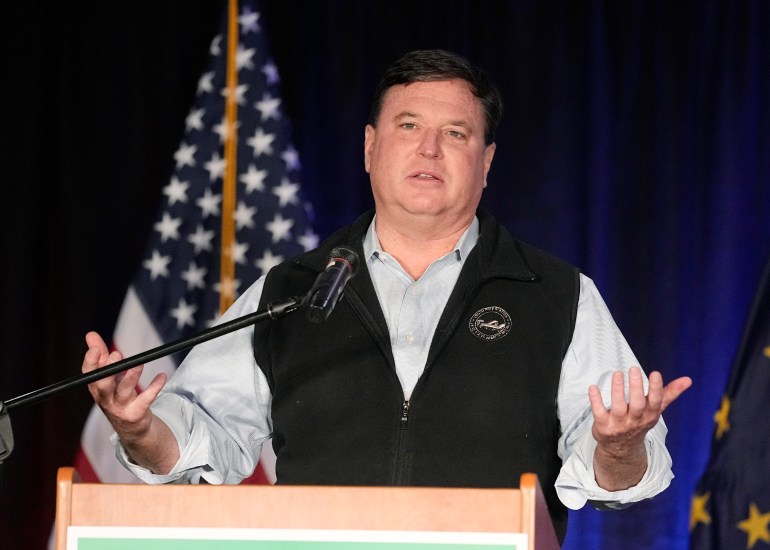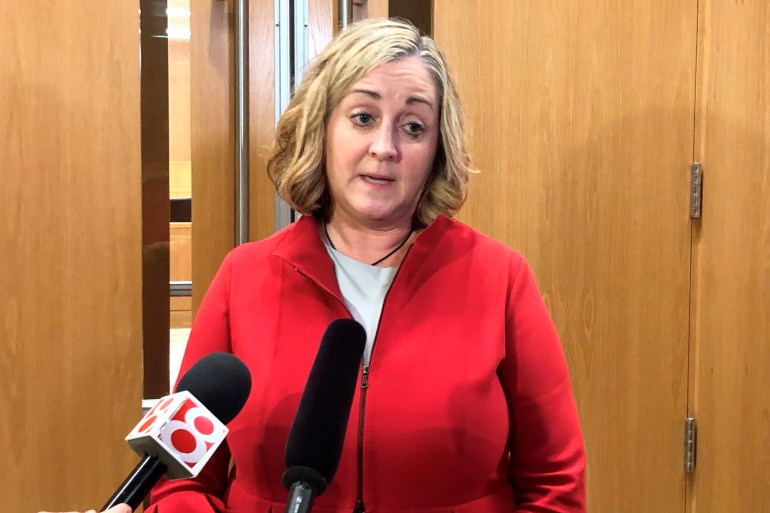US doctor who treated 10-year-old rape victim faces hearing
Doctor Caitlin Bernard faces possible discipline after the abortion she gave a child put her in the national spotlight.

The Indiana Medical Licensing Board in the midwestern United States has opened a disciplinary hearing against a doctor after she spoke out about offering abortion care to a 10-year-old rape victim last June.
The doctor, Caitlin Bernard, initially told her story to The Indianapolis Star newspaper to illustrate the immediate effects of a Supreme Court decision to overturn the constitutional right to an abortion.
Keep reading
list of 3 itemsWhat to know about the abortion pill mifepristone
The states to watch in the fight for US abortion rights
That story sparked a national outcry, with abortion rights activists denouncing the hurdles the 10-year-old faced and opponents blasting Bernard for her actions.
At Thursday’s hearing, the board heard a complaint from Indiana’s Attorney General Todd Rokita, a Republican and opponent of abortion rights, accusing Bernard of violating both state and federal law.
The complaint seeks “appropriate disciplinary action” against Bernard. The board is empowered to suspend or even revoke a doctor’s license.

The attorney general’s office has alleged that Bernard violated Indiana law, by not reporting the rape to authorities, as well as federal standards for patient privacy.
Bernard “has repeatedly and regularly spoken to the press to perpetuate the coverage of her patient’s private life”, the complaint said.
While the patient was never named in any of Bernard’s interviews, the complaint accuses Bernard of triggering “an intense media search” for information about the girl.
Bernard and her lawyers, however, have denied any violation of the Health Insurance Portability and Accountability Act (HIPAA), the law that protects patient privacy.
At Thursday’s hearing, Bernard defended her ability as a doctor to speak broadly about medical issues in the public interest.
“I think that it’s incredibly important for people to understand the real-world impacts of the laws of this country about abortion,” Bernard said. She added that hypotheticals rarely have the same effect on public awareness.
In July of last year, Bernard’s employer, Indiana University Health, issued a statement confirming the doctor had complied with patient privacy laws.
Bernard has also rejected accusations that she did not file the proper paperwork to document the 10-year-old’s case.
She said she followed protocol for reporting child abuse cases to hospital staff. News outlets like the New York Times and National Public Radio have also reported that she complied with procedures for documenting abortions with the state.
At the time of the abortion on June 30, the rape was already being investigated by police in the child’s home state of Ohio.
But with the US Supreme Court’s repeal last year of Roe v Wade — the 1973 decision that guaranteed the constitutional right to an abortion — Ohio was able to impose an existing six-week abortion ban that had been mired in legal controversy since 2019.
That forced the 10-year-old and her mother to seek abortion care across state lines, in Indiana. At the time Bernard first heard about the 10-year-old, she was six weeks and three days pregnant.
The child ultimately received a medication abortion, and a 27-year-old suspect in the rape case was arrested in July.

Bernard’s public statements about the case sparked a political firestorm, with many anti-abortion advocates — and prominent politicians like Ohio Representative Jim Jordan — casting doubt on the story’s veracity.
President Joe Biden, a Democrat, even referenced the story during a news conference.
“A 10-year-old should be forced to give birth to a rapist’s child?” Biden told reporters, venting his outrage. “I can’t think of anything more extreme.”
Alice Morical, Bernard’s lawyer, said that though her client had dealt with child abuse cases before, this story put her under the microscope like never before.
“Dr Bernard could not have anticipated the atypical and intense scrutiny that this story received,” Morical explained on Thursday. “She did not expect that politicians would say that she made the story up.”
Healthcare groups with ties to Bernard, like Planned Parenthood and Physicians for Reproductive Health, have also come to her defence, arguing that attacks on her professionalism are “politically motivated”.
But at Thursday’s hearing, Indiana’s Deputy Attorney General Cory Voight argued that it was Bernard who was advancing her own political agenda.
“There’s been no case like this before the board,” Voight said. “No physician has been as brazen in pursuit of their own agenda.”
Vought’s words echoed that of Attorney General Rokita. As early as July of last year, Rokita appeared on Fox News to slam Bernard as an “abortion activist acting as a doctor”. He promised at the time to investigate Bernard and “fight this to the end”.
Bernard sued to stop his investigation, which subpoenaed patient medical records, but in December, Marion County Judge Heather Welch denied her request.
The judge, however, did also rule that Rokita had violated confidentiality laws himself in publicly discussing his investigation on cable TV news without first filing an official complaint.
Rokita’s media appearances, Welch said, were “clearly unlawful breaches of the licensing investigations statute’s requirement that employees of the Attorney General’s Office maintain confidentiality over pending investigations until they are so referred to prosecution”.